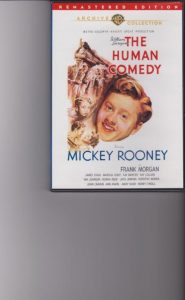As my film classifier-friend said, boy was he disappointed when he went to this one in his youth on the basis of the title and the presence of Mickey Rooney in the lead role. The movie was largely written by William Saroyan who wanted to direct and produce it as well, before he got fired by MGM, and then quickly wrote a successful novel version which was released before the movie came out!
Everything you need to know about this tearjerker about decent American people living in a small California town during WWII is obvious in the opening scene when a cute, freckled five-year-old boy (Ulysses) hears a train whistle and runs down back lanes to get to the railroad tracks where a train is passing so he can wave at the people on the train. The misery of the lingering effects of the Depression can also be seen there as well as the discrimination of Jim Crowism.
The heart-tugging tone continues as the widow-mother talks about death to the naïve boy who keeps asking the tough questions of a typical child about death. By this point, the non-stop cloying background music and American themes begin to assert themselves in just about every scene. The family and townsfolk are basically and uniformly innocent, good, honest, hard-working, caring, and never lie or shirk their social responsibilities. In short, this is an age totally opposite today’s impoverished, diminished T-worlds on both sides of the border.
There will no doubt many cynical modern viewers who say That’s phony, fake; life is not and could never have been that way. But this is a powerful idealistic (what’s wrong with idealism in an age that no longer has any?), optimistic philosophy and societal view that even goes so far as to anticipate the global village when Tom and his fiancé drive by all the different ethnic families in the park in something resembling Alberta’s Heritage Days.
The core plot is about a happy-go-lucky protagonist, Ulysses’ brother Homer (an effective Rooney), who delivers telegrams from the war front to people like the mother-turned-widow on a dime. Whatever flaws that people may have (the alcoholic old man that Homer works for), are contextualized and redeemable in any case. Any rough patches are philosophized with faith, much of it with Christian religious values-plugs.
The didacticism, patriotism, and propagandizing aside, this is still a very emotionally moving (albeit contrived) expression of core family values and truths that have motivated and been instilled in Western people for a century or more. It is a hard film not to like (with the attractive Macauley brothers, including Van Johnson as the oldest brother who goes to war and realistically fears death), that offers hope past human suffering, death, and discrimination. (So much for the human ‘comedy’.) It portrays individuals and family as we romantically/idealistically would like them to be or how we choose to remember them.
There are many memorable, powerful scenes in The Human Comedy including when the outsider-boy takes the younger Ulysses to the town library, when the town boys try to steal apricots, when Ulysses is scared by a Mr. Mechano mannikin, when the old alcoholic dies just as a telegram comes in for the Macauley family, and when the orphan Toby finally acquires a family via tragic circumstance.
All told, there are far more inspiring, heartening reasons to check out this MGM oldie than to quibble about its obvious music and periodic ‘messages.’ For me, warts and all, this movie captures the best of people and olde school film-making. It appeals to the best in people and is a rare treat to behold, especially in today’s world. An interesting glimpse into a world long gone and that in some ways, never was, except in the imaginations and desires of people of the wartime ’40s. Highly recommended for its positive portrayals, strong vignettes, and hopefulness.

